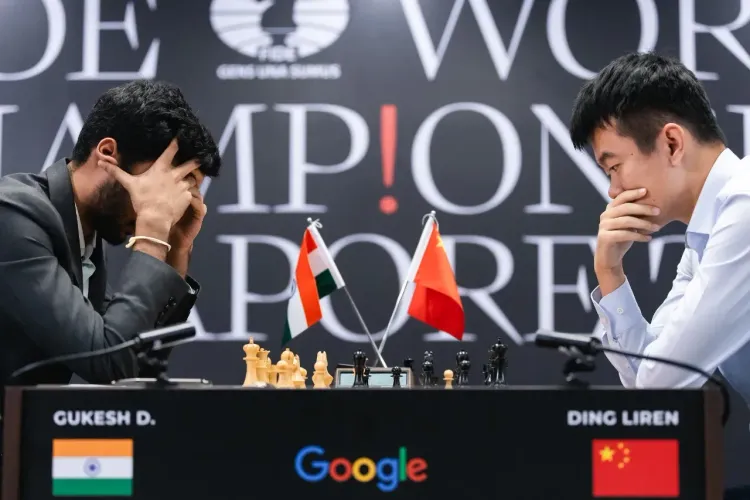World Chess Championship: Gukesh Dommaraju's Missed Opportunities Lead to Draw Against Ding Liren

Singapore, Dec 3 (NationPress) Indian Grandmaster Gukesh Dommaraju squandered a significant positional and time advantage as reigning champion Ding Liren of China bounced back from a blunder and mounted a strong defense to secure a draw in Game 7 of their FIDE World Chess Championship Final match at Resorts World Sentosa here on Tuesday.
In a game where fortunes shifted dramatically, Gukesh had a golden chance to win and take a one-point lead in the 14-game series, where reaching 7.5 points clinches the title and a substantial portion of the prize fund of US$2.5 million.
Unfortunately, Gukesh overlooked several crucial move sequences that could have led him to victory. He eventually found himself in significant time trouble as the Chinese Grandmaster exchanged pieces to guide the game towards a draw. Ding narrowly escaped what he referred to as a 'hopeless position' following a blunder on the 40th move but credited his discovery of an 'interesting idea' that saved him.
A draw was agreed upon after 72 moves in a marathon match lasting over five and a half hours, marking the longest game of this championship. Both players have now accumulated 3.5 points from seven games and will face off again on Wednesday for game eight.
Gukesh's opening strategy was well-conceived, with his team preparing a strong novelty on move seven in a familiar line, allowing him to maintain a time advantage for most of the game. The Indian Grandmaster, the youngest player to win the Candidates, surprised many with his opening choice, opting for an interesting plan. Ding selected the Kings Indian Defense, which transposed into a Neo-Grunfeld Defense: Classical Defense setup.
Despite holding a significant positional and time advantage, Gukesh made several inaccuracies, ultimately losing his edge by simplifying the position. Ding mounted a solid defense even as he faced time pressure, at one point having 21 minutes to make 20 moves to reach the first-time control of 40 moves within 90 minutes.
With just seven seconds remaining on his clock, Ding Liren blundered during the last move before the time control. Instead of playing 40...Ke5, he should have chosen 40...Nc8-b6, which would have provided a blockade and strong chances for a draw.
As victory appeared to be within reach for the challenger, nerves began to play a significant role. Converting the endgame proved to be a challenging task, and under time constraints, Gukesh could not secure the win.
The 18-year-old Gukesh, aiming to become the youngest World Champion in history, also lost his time advantage as he spent 20 minutes on his 28th move. Although he made the best move of that position by placing his rook on a5, Ding managed to exchange queens, and despite making the 40th move with just seven seconds left, he successfully neutralized some of Gukesh's advantages.
They arrived at a rook ending with minor pieces, Gukesh holding an extra pawn, but many experts believed that the advantage was insufficient. Former women's No.1 Susan Polgar commented that Gukesh's decision to simplify the position had backfired.
Once again, Ding fell behind on time, having less than 10 minutes to complete the game. He also played an inaccurate move on his 40th turn, according to Polgar, which granted his Indian opponent some advantage. However, Gukesh wasted both his positional and time advantages yet again and played inaccurately, leading to an equal position. Gukesh further compounded his difficulties by overlooking a winning move when he retreated his bishop on the 46th move.
Ding continued to play accurately, and Gukesh found himself with mere seconds to make his moves as the game edged closer to a draw, leaving Gukesh lamenting some of his choices throughout the game.
Gukesh expressed disappointment, stating that missing some of the strong defensive moves presented by his opponent was 'unpleasant'.









